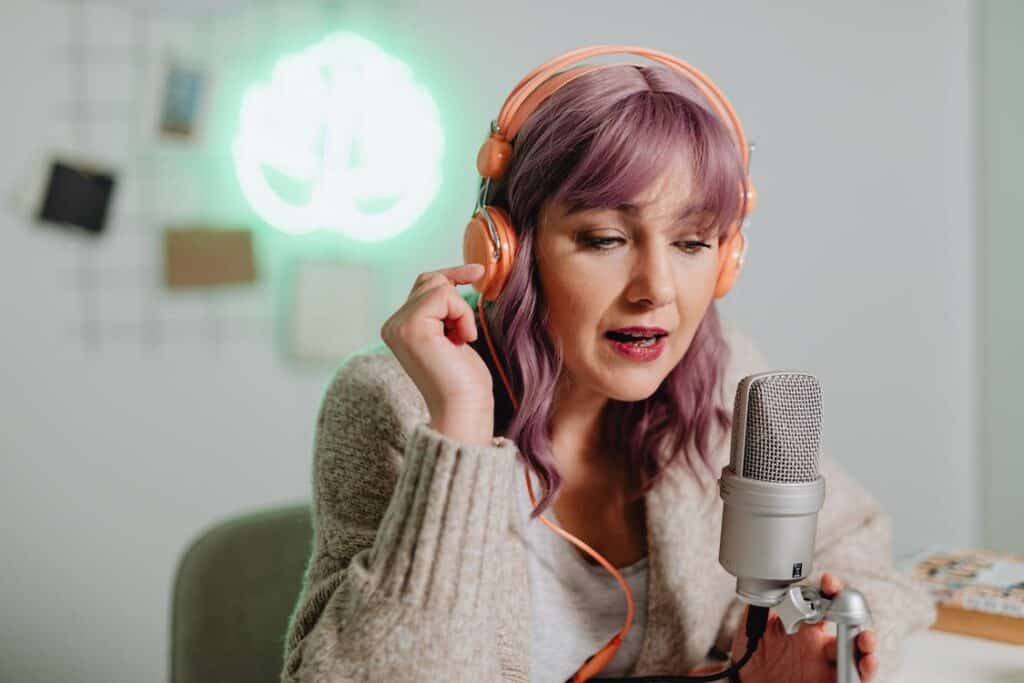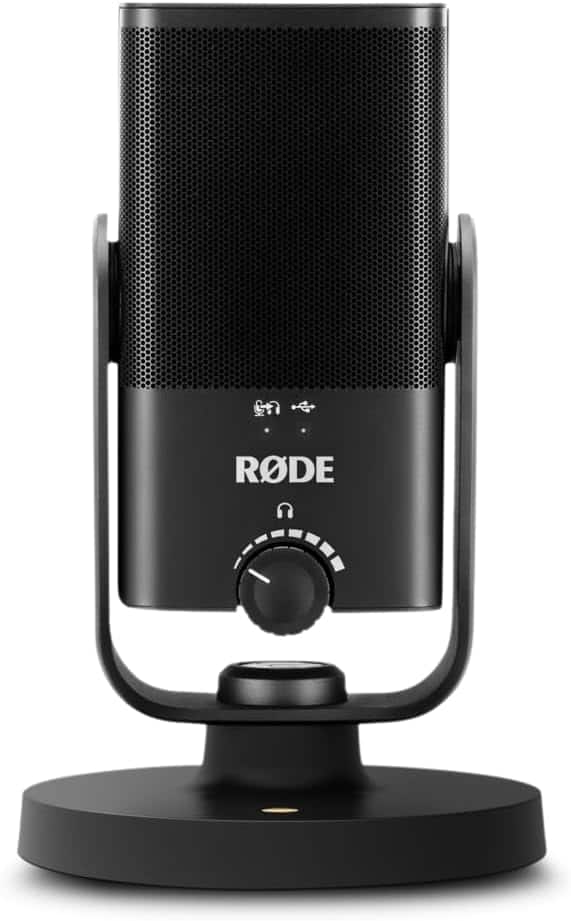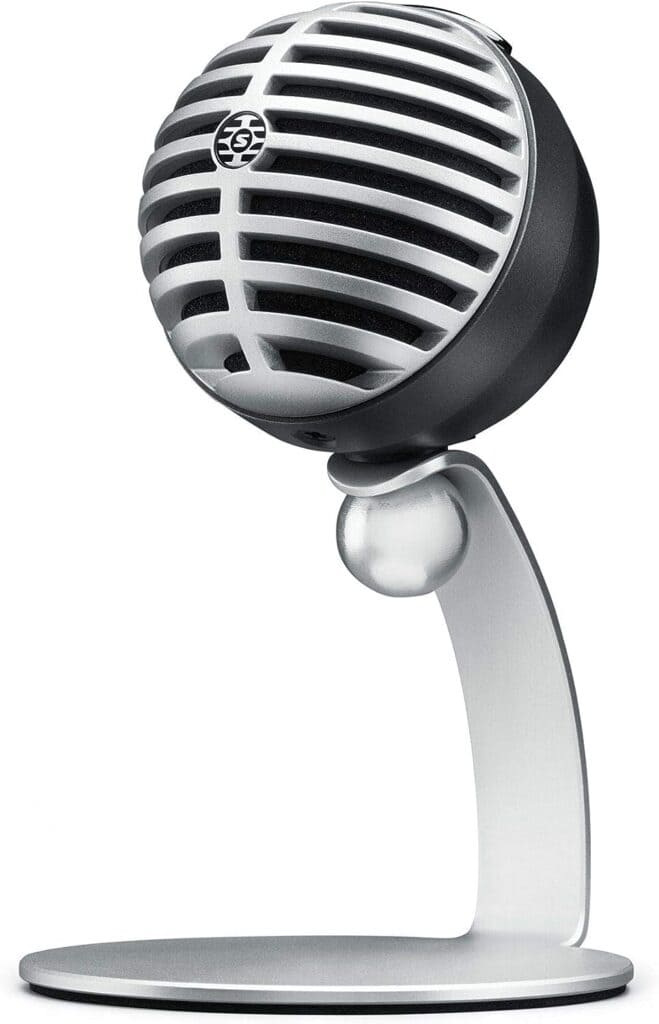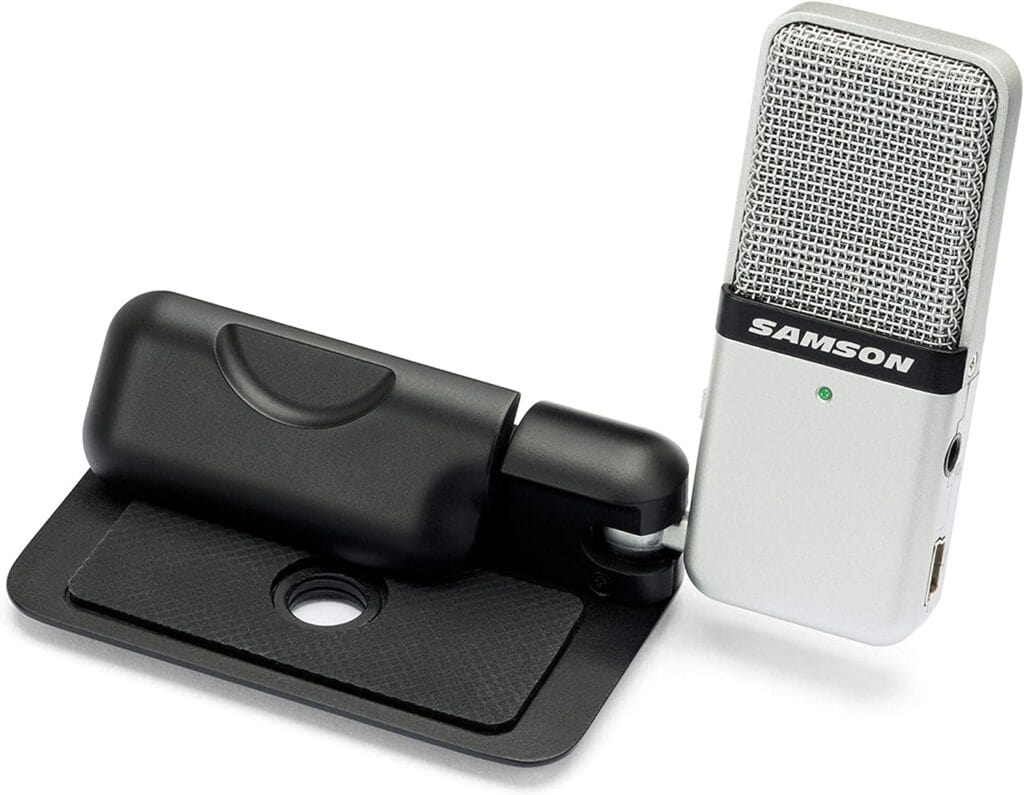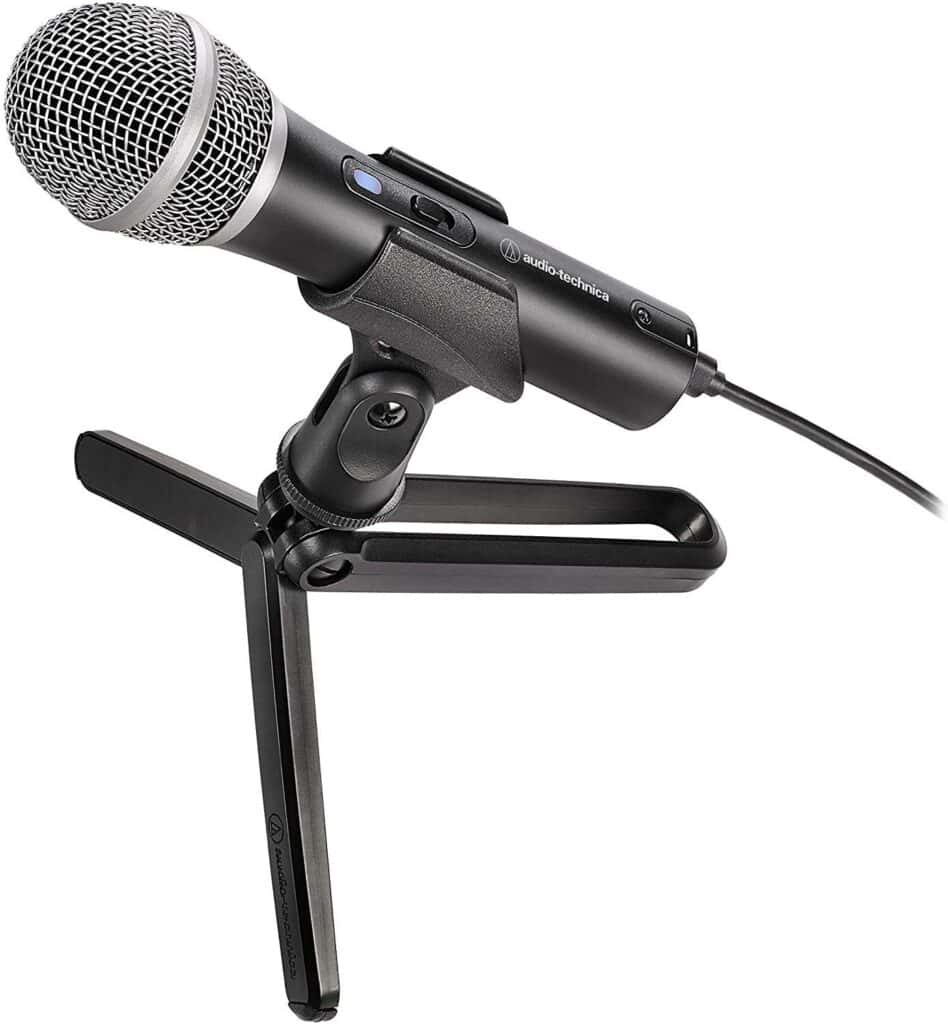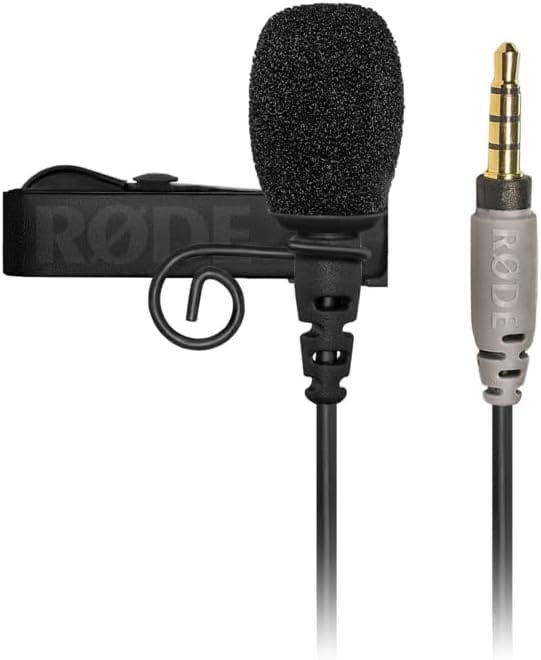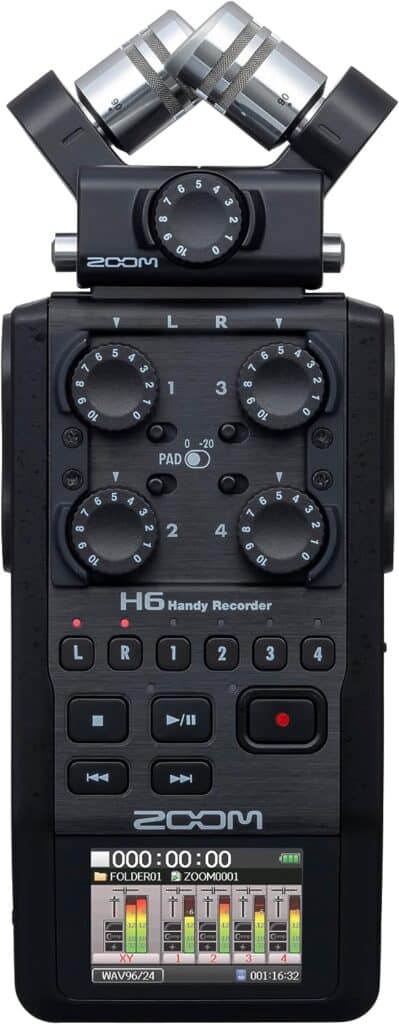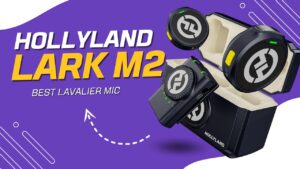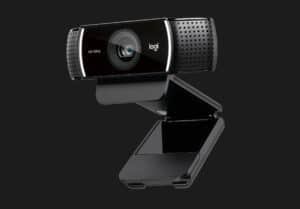Your microphone choice can make or break your travel podcast’s audio quality. In this article, we unveil the top picks for the best travel microphones for podcasting that strike the perfect balance between portability and performance, ensuring your listeners join you with crystal-clear sound.
Castos is a participant in the Amazon Services LLC Associates Program. We may earn commissions from your purchases on Amazon.com, though at no cost to you.
Tip
Thinking about starting a podcast? It’s easier than you think. Read our comprehensive guide on starting your own podcast.
What is a Travel Microphone?
Before we get into the best travel microphones for podcasting, let’s understand what they are.
A travel microphone, also known as a portable microphone or a travel-friendly microphone, is a type of microphone designed for use while traveling or on the go. These microphones are typically compact, lightweight, and easy to transport, making them ideal for vloggers, podcasters, journalists, musicians, and anyone who records in various locations.
Key features of travel microphones:
- Portability: Travel microphones are designed to be easy to carry in a backpack or luggage, often coming with protective cases or pouches.
- Compact size: They are smaller in size compared to studio-grade microphones, making them convenient for travel.
- Durability: Travel microphones are often built to withstand the rigors of travel, with sturdy construction and materials that can handle being moved around frequently.
- USB or XLR connectivity: Some travel microphones connect via USB for plug-and-play convenience with computers and portable devices, while others offer XLR connections for higher-quality audio and compatibility with audio interfaces.
- Built-in features: Many travel microphones come with features such as shock mounts to reduce handling noise, pop filters to minimize plosives, and adjustable gain settings.
- Power options: Some travel microphones are battery-powered or have rechargeable batteries, allowing for use in locations without power outlets.
- Directional patterns: Travel microphones may have different directional patterns (e.g., cardioid, omnidirectional, or shotgun) to suit various recording situations.
- Quality of sound: While travel microphones are designed for portability, many are capable of delivering high-quality audio recordings suitable for a range of professional applications.
The 9 Best Travel Microphones for Podcasting
Choosing a microphone is one of the most important components of starting a podcast. The single thing you can do to drastically improve your audio quality, especially for a podcast that moves around. Here’s our list of the best travel microphones for podcasting.
1. Rode NT USB Mini
The Rode NT-USB Mini is a compact USB microphone tailored for podcasting and portable recording. Its small form factor, measuring only 4.5 inches, ensures easy travel without compromising audio quality. The cardioid pickup pattern minimizes background noise, ideal for noisy environments while on the road.
This microphone connects directly to a computer via USB, eliminating the need for additional equipment, making it hassle-free for travelers. It also includes a built-in pop filter to reduce plosive sounds and a magnetic desk stand for versatile positioning.
Its impressive audio quality, portability, and user-friendly features make the Rode NT-USB Mini a strong choice for podcasters seeking a travel-friendly microphone that delivers professional-grade sound without the bulk, ensuring your podcast recordings remain top-notch while on the go.
2. Shure SM58
The Shure SM58 is a legendary dynamic microphone renowned for its durability and versatility. While it’s not as compact as some dedicated travel mics, it can still be a good option for podcasters on the go. The SM58’s rugged build can withstand the rigors of travel, ensuring it remains reliable in various environments.
Its cardioid pickup pattern minimizes background noise, so it’s good for recording in less-than-ideal acoustic conditions often encountered while traveling. The SM58 also includes an internal shock mount to reduce handling noise.
One of the key advantages is its versatility. Beyond podcasting, the SM58 is widely used for live performances and studio recording, making it a multi-purpose investment. However, it may require an audio interface or mixer with XLR inputs, adding some bulk to your travel setup.
3. Shure MV5
The Shure MV5 is a compact and portable USB condenser microphone designed for podcasters and content creators on the move, making it one of the best travel microphones for podcasting. Its travel-friendly features make it an excellent choice for mobile podcasting.
Measuring just over 2.5 inches in diameter, the MV5 is incredibly compact, making it easy to stow away in a backpack or travel bag. It connects directly to a computer or mobile device via USB, eliminating the need for additional equipment.
Despite its small size, the MV5 delivers high-quality audio with various presets for different recording scenarios. The cardioid polar pattern helps reduce background noise, ensuring clear and focused recordings even in less-than-ideal environments.
The included desktop stand is both adjustable and detachable, providing flexibility in positioning during recording. Additionally, the MV5’s durability and ease of use make it an excellent choice for podcasters who need a reliable, portable microphone to maintain recording quality while traveling.
4. Rode Podcaster
The Rode Podcaster is a dynamic USB microphone designed with podcasters in mind. It offers several features that make it suitable for podcasting on the go.
The microphone connects directly to a computer via USB, simplifying setup and eliminating the need for additional audio interfaces. Its cardioid pickup pattern effectively captures your voice while minimizing background noise, crucial for recording in noisy environments.
The Podcaster is known for its robust build quality, ensuring durability during travel. It also includes an integrated shock mount to reduce vibrations and handling noise. It’s not as small as some portable mics, but it’s still relatively compact and can easily fit in a travel bag or suitcase.
For podcasters who prioritize audio quality and reliability, the Rode Podcaster is a solid choice, offering professional-grade performance while maintaining a degree of travel-friendliness.
5. Samson Go Mic
The Samson Go Mic is a highly portable and versatile USB microphone, making it an excellent choice for travel podcasters. Its compact design, measuring around 2.5 inches in width, and lightweight build make it incredibly travel-friendly. It easily fits into a pocket or laptop bag.
Despite its small size, the Go Mic delivers impressive audio quality with selectable pickup patterns (cardioid and omnidirectional), allowing for flexibility in recording various situations. This versatility is particularly valuable for podcasters recording in different environments.
The microphone directly connects to a computer or mobile device via USB, eliminating the need for extra equipment. It also features a built-in headphone output for real-time monitoring.
The Samson Go Mic’s affordability, portability, and overall performance make it a convenient and cost-effective choice for podcasters who require a travel microphone that doesn’t sacrifice audio quality or versatility.
6. Audio-Technica ATR2100x
The Audio-Technica ATR2100x is a versatile and travel-friendly dynamic microphone designed for podcasting and content creation. Its features and portability make it an excellent choice for podcasters on the go.
Measuring around 7 inches in length, the ATR2100x is compact and lightweight, making it easy to transport in a backpack or travel bag. It connects via both USB and XLR, providing flexibility for different recording setups. This dual connectivity allows you to use it with computers, mobile devices, and audio interfaces.
The microphone offers a cardioid pickup pattern to capture clear audio while reducing background noise, which is valuable when recording in various environments during travel.
The ATR2100x’s rugged build ensures durability during transit, and it includes a built-in headphone jack for real-time monitoring. Its versatility, combined with the convenience of dual connectivity, makes it a reliable and adaptable travel microphone for podcasters looking to maintain audio quality on the road.
8. Rode SmartLav+
The Rode SmartLav+ is a lavalier microphone specifically designed for portable recording, making it an excellent choice for podcasters who require a compact and travel-friendly microphone. Its small and discreet form factor, resembling a lapel pin, allows for inconspicuous recording during travel.
The SmartLav+ is incredibly easy to use, connecting directly to smartphones and tablets via a 3.5mm TRRS connector, which is compatible with most mobile devices. This plug-and-play convenience makes it ideal for recording podcasts on the go without the need for additional equipment.
Despite its size, the SmartLav+ delivers clear and professional-grade audio with an omnidirectional pickup pattern, capturing sound from all directions. Its durable construction ensures it can withstand the rigors of travel.
The combination of portability, simplicity, and audio quality makes the Rode SmartLav+ a great travel microphone for podcasting, allowing you to maintain recording quality while staying compact and mobile.
9. Zoom H6
The Zoom H6 is a versatile portable audio recorder that also functions as an excellent travel microphone for podcasting. Its compact size and lightweight design make it a practical choice for podcasters on the go.
The H6 features interchangeable microphone capsules, allowing you to adapt it to various recording situations. It comes with a detachable XY stereo microphone, making it suitable for capturing high-quality ambient sound during travel or interviews. Additionally, it has four XLR/TRS combo inputs, enabling you to connect external microphones for multi-person interviews or studio-quality recordings.
The Zoom H6 records directly to SD cards, eliminating the need for a computer while traveling. Its onboard display and user-friendly interface make it easy to monitor and adjust settings on the fly.
Tips for Recording a Traveling Podcast
Now that you know the best travel microphones for podcasting, let’s go over some basic tips to make your on-the-go recordings more successful.
1. Select the Right Equipment
Invest in portable, high-quality recording equipment. A portable microphone and headphones are essential for capturing clear audio on the go. Look for compact, USB-powered microphones or smartphone-compatible options for ease of use.
2. Protect Your Equipment
Use padded carrying cases or protective bags to keep your equipment safe and secure. When not in use, store your gear in a secure location to prevent theft or accidents.
Additionally, consider equipment insurance or warranties to mitigate potential financial losses in case of unexpected mishaps. Protecting your equipment ensures you can continue recording your traveling podcast without interruptions and costly replacements.
2. Minimize Background Noise
Record in quiet environments whenever possible. Choose quiet locations or use noise-canceling equipment to reduce unwanted sounds. This ensures your listeners can focus on your content without distractions.
3. Use Windshields and Pop Filters
If recording outdoors, invest in windshields and pop filters for your microphone to minimize wind noise and plosive sounds (like ‘p’ and ‘b’ sounds). These accessories improve audio quality when recording in challenging conditions. They’re also very cheap.
4. Backup Your Recordings
Travel podcasts can be unpredictable, so always back up your recordings. Carry extra memory cards or an external hard drive to prevent data loss. It’s better to be safe than sorry when you’re far from home.
5. Edit and Enhance Post-Production
Edit your recordings to remove background noise, awkward pauses, and mistakes. Enhance audio quality through post-production techniques like equalization and noise reduction. Make your podcast sound polished and professional.
6. Respect Local Laws and Customs
Research and respect local laws and cultural norms, especially regarding recording and privacy. Always ask for permission when recording people or sensitive locations. For instance, in some U.S. states, you are required to get permission from every voice that appears on your show – including people in the background.
More Great Podcast Microphones
If none of our recommendations work for you, check out our list of the best microphones for podcasting and our complete podcasting equipment guide.
We also have some similar guides that might interest you, depending on your needs:
